Christmas at Dismas: How a South Bend halfway house reduces recidivism by gifting belonging
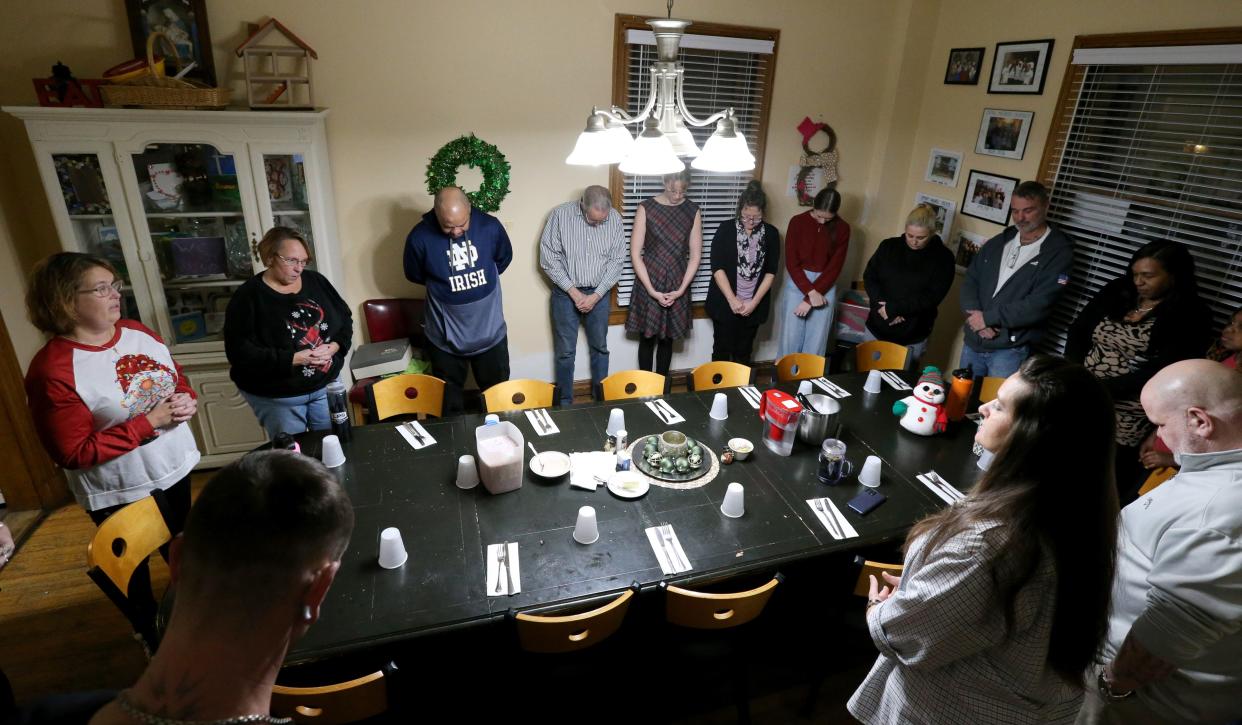
SOUTH BEND — When Michael Wonsey walked into Dismas House about two weeks ago, having spent the last 24 years of his life in prison, he was immediately hugged and told, “Welcome home.”
Wonsey, 52, had lost so much since he was locked up at age 28.
He and his ex-wife lost their four kids to the foster care system. Two are in prison, he said. He’s still in touch with only one of his sons, who recently visited to make sure his father was mentally stable enough to meet his grandchild.
His dad died in 2004, his mom in 2007.
Then his older brother died from fentanyl use in 2011. Ten years later, he lost his younger brother to the same deadly opioid. Wonsey was told that police found his younger brother slumped in the driver’s seat of a running truck.
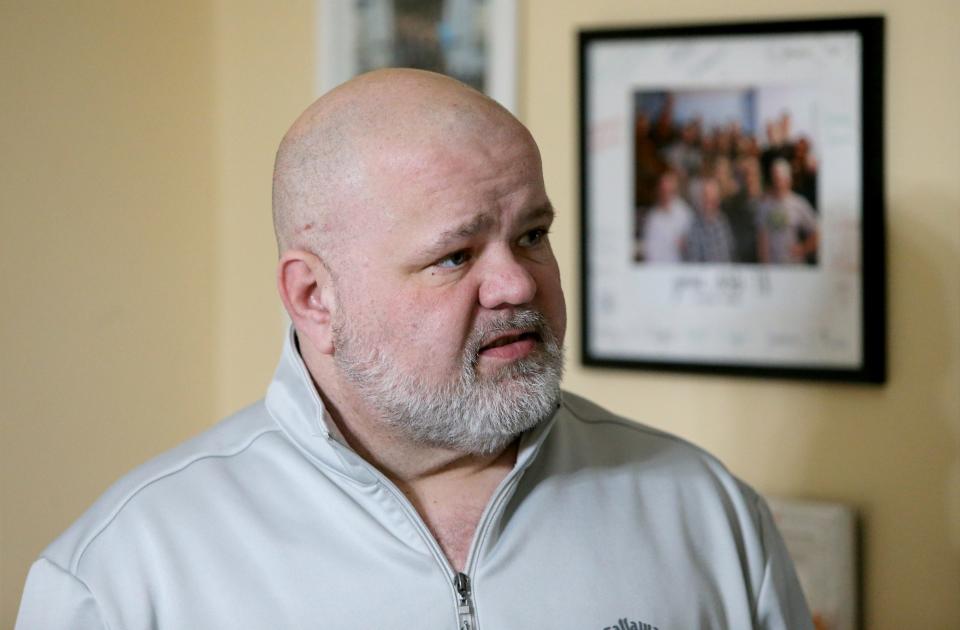
Wonsey, a stout man with a soft voice, recited these losses matter-of-factly before a dinner at Dismas House this week. He seemed stunned by how thorough the world had been at depleting his family. And all the while he was trapped. He soon broke down in tears.
That’s why everyone gets a hug when they walk into Dismas House, said Maria Stancati, the director of the transitional home for people leaving incarceration. Everyone really needs one.
Only recently — and somewhat reluctantly, for she is an assertive hugger and knows how it feels to have been in prison — has Stancati started to ask people, in recognition of potential trauma, whether they will accept a hug.
She says no one has turned her down.
St. Dismas, the Good Thief
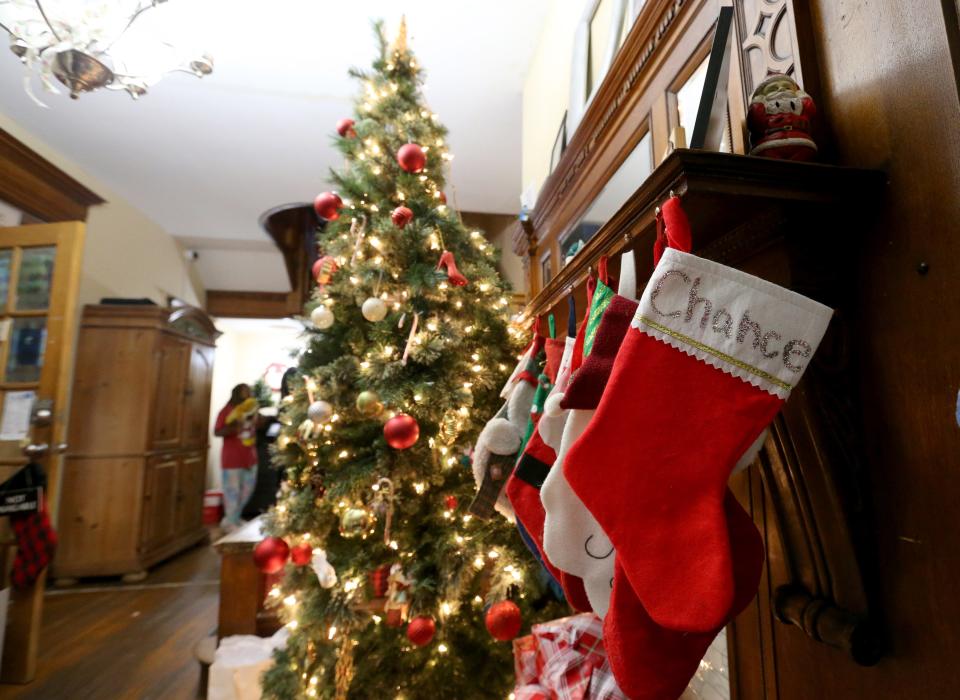
Since opening in Monroe Park in 1986, Dismas House has been home to a few dozen people each year who strive to secure good jobs, to find belonging in the community and, crucially, not to return to prison. Leaders say it’s housed more than 1,600 men and women over nearly four decades.
Recidivism statistics are daunting. Federal figures show that, during a recent nine-year span, two of three people released from prison were arrested again within three years.
Dismas House — named after St. Dismas, the Good Thief who was penitent when crucified alongside Jesus in the Gospel of Luke — claims to cut national rates of reoffending in half.
Residents must stay for at least 90 days and leave within two years. The average stay is six months. They’re expected to go to work and pay $115 a week, though many can stay free for three months through Indiana’s relapse prevention program.
Each applicant must pass an interview with Stancati, whose ears are finely tuned to reject platitudes. People convicted of sex offenses, arson or repeated acts of violence aren’t allowed.
In exchange for a bed in the 140-year-old purple house on South St. Joseph Street, as well as all the appliances of domestic life and a host of social services, residents must adhere to the “Dismas House Rules,” which are posted right on the front door.
There’s no violence; no alcohol or illegal drugs; no guests allowed anywhere but the main floor; no smoking inside; no “Disturbing the Peace,” an offense encompassing an impressive array of anti-social behaviors including spreading rumors, stealing and making rude remarks about someone’s identity; and no sex between any Dismas affiliates.
“That’s a hard one,” said Maria Kaczmarek, who ran the house for 22 years before Stancati took over, of the no-sex rule. “That can be a very hard one. Life is co-ed. And if you can’t control yourself, then you don’t need to be here.
“And some people would break the rule,” she said, “and I’d have to ask them to leave.”
There is one more set of rules. Mandatory house meetings are held once a week. And, with reasonable exceptions, all residents are required to attend a house dinner at 6:30 p.m. from Monday to Thursday every week.
Kaczmarek said she ran the home much like she did the Girl Scout troops she’d led earlier in her life. Stancati, a west side native who taught middle and high school for years, said she runs the place like a classroom.
But Stancati runs it with an even more valuable perspective: She’s an ex-resident.
'Everyone's like a family'
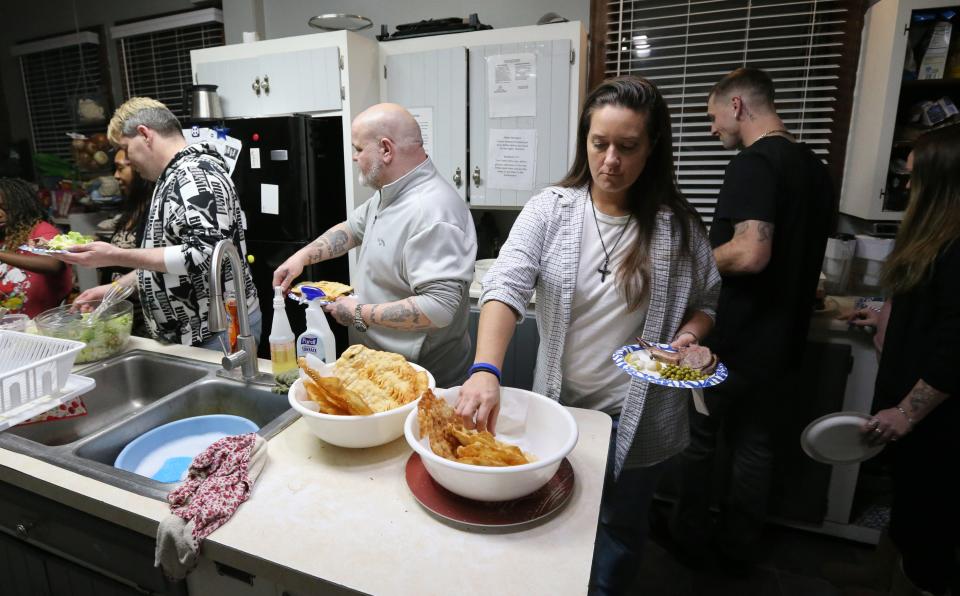
At “Icelandic Christmas” on Wednesday, when a Dismas board member had prepared a feast of lamb chops and roasted potatoes and a buttery, wafer-like flatbread called Icelandic leaf bread, residents and staff stood together around the long dinner table and said grace.
The house is a blend of middle-aged people who have spent a decade or more in prison and younger residents returning from shorter sentences, earnestly working to stay the course.
Nicki Bell, a 38-year-old mother, spent a few years in prison for manufacturing methamphetamine in LaGrange County, where she lived with her husband.
The first time she got out, she went back to her Michigan hometown to stay with her grandparents. She was heeding the advice she’d received in recovery to change the people, places and things in their life — to replace all the nouns that led her to prison.
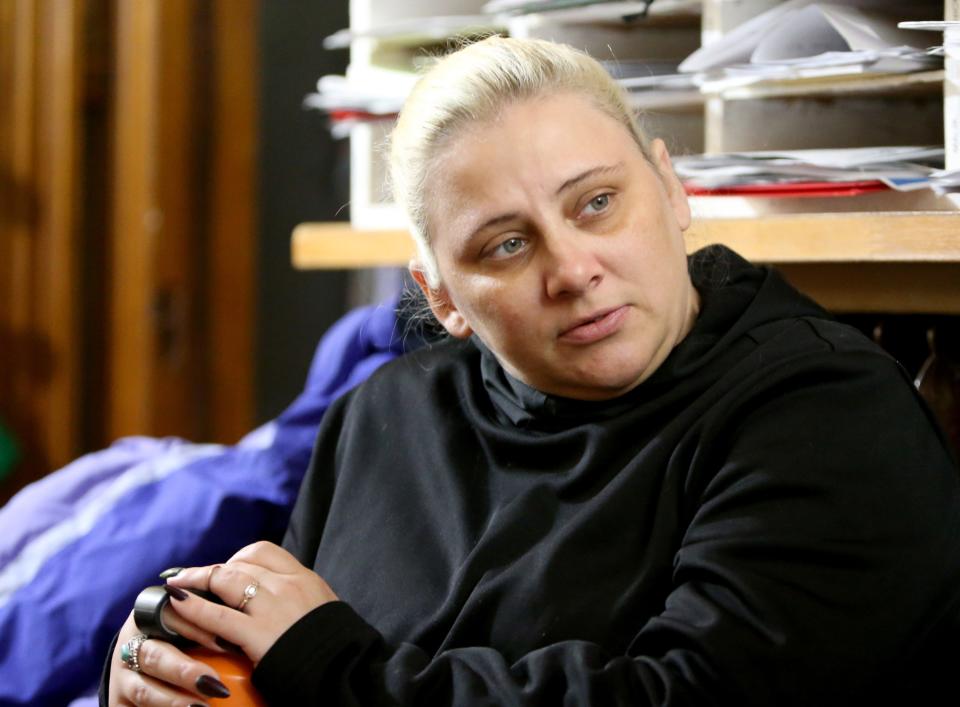
But before long, she said, her grandparents kicked her out and she crossed the state line to Indiana. About three years after the first offense, Bell was arrested for possession of meth and incarcerated.
This time around, she applied to Dismas House. She’s been there about two months. She’s more driven now to reconcile her relationships with her two oldest children and to be there for her youngest son, who’s been her rock since she was first imprisoned.
“I never lied to my kids … I wouldn’t lie to them like my family lied to me about why my dad was in jail a lot,” Bell said. “I didn’t lie to my kids. And (my youngest son) was the one that always told me, ‘Mommy, you’re just sick. You just need to get better.’”
William Hackett, who’s 47, said he was 19 years old when he got locked up. He remembers the acute dread of the middle part of those roughly 27 years, when he couldn’t fathom that he would ever escape.
He found Dismas House during his time at the South Bend Community Re-entry Center, where adults within a year of finishing their sentence are allowed to work and take part in programs that help them reintegrate into community life. He volunteered at a weekly dinner and saw what he’d sorely missed: a family.
“I’ve been here two months, and everyone’s like a family,” Hackett said. “We all treat each other like family. We support each other.”
A director who knows how prison feels
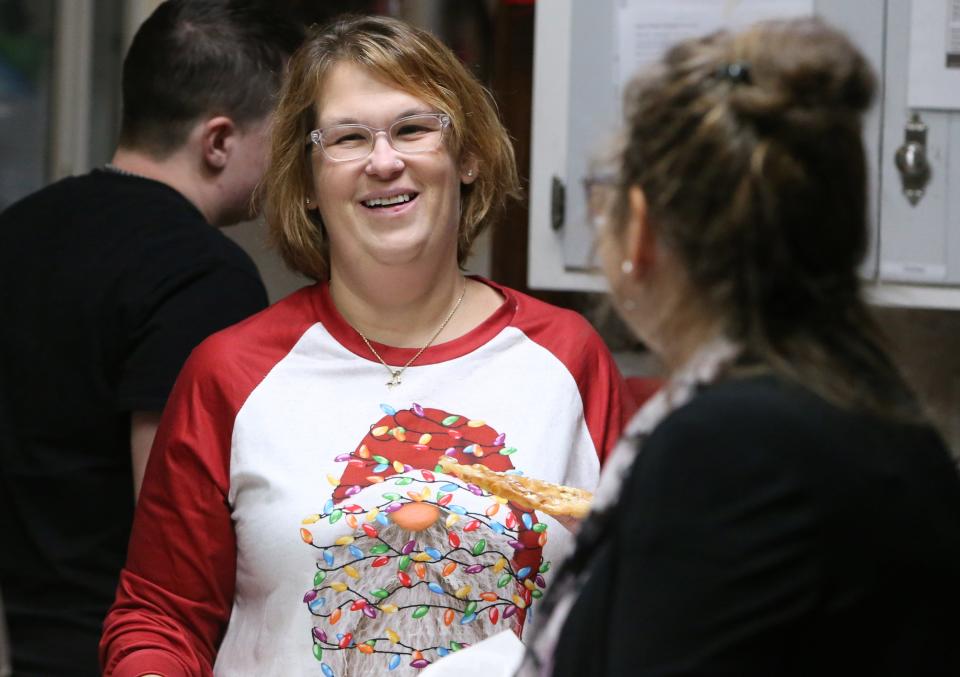
If Dismas House holds a family, then Stancati is mom.
Her credibility as director comes from a year she spent in prison, where shared a cell with two convicted murderers.
Stancati and her twin-sister, Michelle, were arrested 15 years ago after a bathtub of cooking meth caught fire in their East Woodside Street home. Both were addicted to the drug. But a judge gave Maria a lighter sentence because she said she’d moved out of the home in protest and was deceived by her sister.
Stancati left prison and began a 14-month stay at Dismas House. After all the media attention her release attracted, she wanted to hide from the community, she said. She initially waited tables at a Greek restaurant, despite her master’s degree. She wore sunglasses and a baseball cap pulled down over her face like a disgraced celebrity.
For years after graduating from Dismas House, Stancati volunteered and served on the nonprofit’s board of directors. She worked at Goodwill for a while. After her shifts, she’d bring her young son to Dismas dinners, where all of the residents would feed and entertain him.
In 2014, Kaczmarek hired Stancati as the transitional home’s program director. Anticipating Kaczmarek’s retirement, board members chose Stancati to be co-director in 2017. The next year, she assumed the top role.
“I’m mama to all these people,” Stancati said. “Some of them are older than me. But I’m still mama to all these people. These people count on me, and that’s important to me. And they know that they’re loved and respected, and that’s the big thing.
“Because when you talk about felons in this world, the thing they aren’t is loved and respected.”
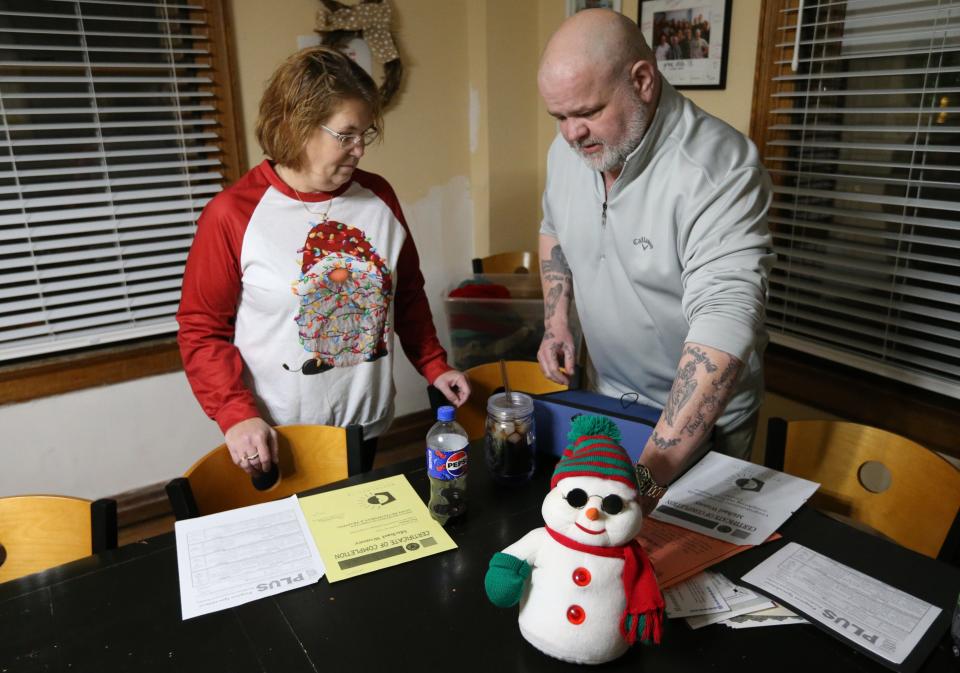
'This could be life'
After two dozen years in prison, Wonsey was surprised by Stancati’s hug.
He couldn’t say how long it had been since a woman hugged him. You don’t get that in prison.
And he wasn’t used to seeing children running around, either. The new program director, Brandy Anderson-Willis, brings her granddaughter to hang out many nights. Stancati’s son is almost 10 now, years beyond the days where he’d climb the old home’s wonderfully creaky staircase and knock on residents’ doors, pleading, “I’m here! Will you play with me?”
Wonsey wasn’t sure he’d be accepted to Dismas House. His charges were severe. He said he was arrested as an accomplice to murder, and in Indiana, prosecutors could and did pursue murder charges against him in 2000. He was convicted just over two decades ago.
He told his story to Stancati during his interview. Though he was on parole in the state of Michigan, Wonsey said he crossed the state line to attend a house party in Mishawaka. He says conflict broke out and the man who invited him killed two attendees.
Wonsey says he fled the scene after the first death and was later arrested. Court records confirm that he filed a post-conviction relief petition in 2003 to challenge the outcome of his case.
“Believe me,” he told The Tribune, “I wish I would have saved at least one of them. I wish I would have stopped the whole process. But I live with it every day. I think about it every day.”
Since the end of 2018, while he’s been in prison, Wonsey has saved up money working at a pallet shop. He shared a letter from a supervisor saying that he’d quickly been promoted and that the shop wouldn't hesitate to hire him once he’s free. Once a shoulder injury heals, he’ll work there again.
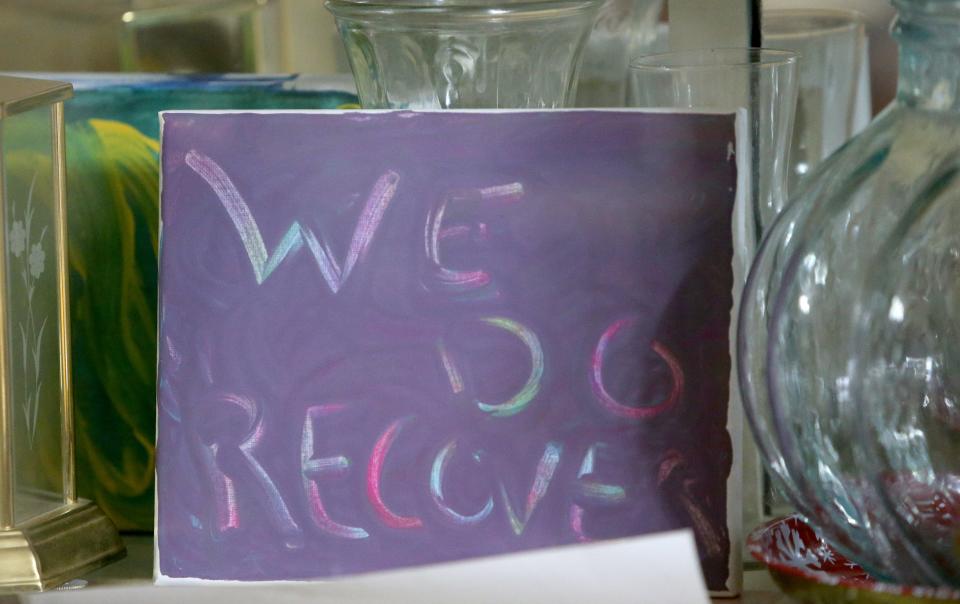
For the week of Christmas, he said, his goal was not to be a sobbing mess. He has been supporting his new housemates where he can, he said, buying (alcohol-free) cold medicine for some of them who fell ill. He’s eager to rebuild his relationship with his son and meet his grandchild.
The gift Dismas House gives to people, supporters say, is a second chance.
What Kaczmarek most looked forward to during her tenure as director was the “aha moment," when residents started to use that gift to reclaim themselves.
“All the sudden they’re being held accountable and not getting yelled at, doing the right thing, and things are going smoothly,” Kaczmarek said. “They just can’t believe this could be life.”
Email South Bend Tribune city reporter Jordan Smith at JTsmith@gannett.com. Follow him on X: @jordantsmith09
This article originally appeared on South Bend Tribune: South Bend's Dismas House gives second chance to people leaving prison

